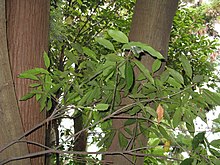Quercus acuta
| Japanese evergreen oak | |
|---|---|

| |

| |
| Scientific classification | |
| Kingdom: | Plantae |
| Clade: | Tracheophytes |
| Clade: | Angiosperms |
| Clade: | Eudicots |
| Clade: | Rosids |
| Order: | Fagales |
| Family: | Fagaceae |
| Genus: | Quercus |
| Subgenus: | Quercus subg. Cerris |
| Section: | Quercus sect. Cyclobalanopsis |
| Species: | Q. acuta
|
| Binomial name | |
| Quercus acuta | |
| Synonyms[2] | |
|
List
| |
Quercus acuta, the Japanese evergreen oak, is an oak native to Japan, South Korea, Taiwan, and China's Guizhou Province and Guangdong Province.[3] It is placed in subgenus Cerris, section Cyclobalanopsis.[4]
Description
[edit]Due to its foliage and habitat, it looks rather unlike most other oaks. Quercus acuta is usually bushy and densely domed, reaching a height of 14 meters. The bark is smooth and dark grey. Leaves are dark and glossy above and yellowish beneath. They narrow to a long, finely-rounded tip. The flowers are on a stiff 5 cm catkin.
Heartwood is pale reddish brown to reddish brown. Sapwood is pale yellowish brown with a slightly reddish color.[5]
Common names
[edit]In Japan, it is called akagashi (赤樫 - あかがし), but is also known by the names oogashi (大樫 - オオガシ) and oobagashi (大葉樫 - オオバガシ).[6] [7]
In the Korean language, it is 붉가시.
Uses
[edit]Like shirakashi (白樫 - しらかし) (Quercus myrsinifolia), whose wood is often called shirokashi outside of Japan, and other related sub-genera, Japanese Evergreen Oak, or akagashi, is a preferred choice for Japanese martial arts practice weapons such as bokken.[8][9] This is due to its uniformly tight grain structure resulting from its continuous growing season. It should not be confused with the oriental or Asian white oak, Quercus aliena.
References
[edit]- ^ Botanic Gardens Conservation International (BGCI) & IUCN SSC Global Tree Specialist Group (2018). "Quercus acuta". The IUCN Red List of Threatened Species. 208. IUCN. e.T62005627A13677623. doi:10.2305/IUCN.UK.2019-1.RLTS.T62005627A136776235.en.
- ^ The Plant List, Quercus acuta Thunb.
- ^ "Quercus acuta"Oaks of the World Accessed 8 April 2011.
- ^ Denk, Thomas; Grimm, Guido W.; Manos, Paul S.; Deng, Min & Hipp, Andrew L. (2017). "Appendix 2.1: An updated infrageneric classification of the oaks" (xls). figshare. Retrieved 2023-02-24.
- ^ 木材図鑑 - Picture Book of Woods [1] Accessed 22 March 2017. (in Japanese)
- ^ TSUYUZAKI Shiro's Plant List - Hokkaido University
- ^ 植物和名ー学名インデックス YList - The YList Botanical Name - Scientific Name Index [2] Accessed 22 March 2017. (in Japanese)
- ^ Zaimoku - Wood for Weapons [3] Accessed 22 March 2017.
- ^ James Goedkoop: "Woods for Training Weapons". Aikiweb [4] Accessed 10 November 2012.

